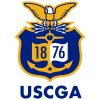Community Involvement
The goal of the Coast Guard’s community relations initiatives is to foster positive relationships within the communities where we live and operate. We develop, maintain and improve public understanding and support of the Coast Guard’s missions through interaction with our communities. Learn more about some of the Coast Guard Academy’s programs.
The Coast Guard Academy is a huge proponent of the Coast Guard’s Partnership in Education (PIE) program and as such is committed to enhancing educational opportunities and career awareness for local youth through direct participation in education-related initiatives. Collaboratively, cadets, faculty and staff put in over 1, 575 hours tutoring, teaching lessons, mentoring, coaching, announcing/commentating at local sporting events, and even taking over classrooms for a day in a local elementary school. Approximately 50 cadets volunteer on a regular basis, however, the candidate pool is is corps-wide and the faculty and staff are also strongly committed and engaged.
As part of PIE, Science Partnership for Innovation and Learning (SPIL) is a partnership between the New London, Connecticut school district and the U.S. Coast Guard Academy (USCGA) Science Department. The program is designed to foster relationships with the local community by providing high school students with college experience and by exposing them to opportunities available in science, in particular at the USCGA. SPIL offers the perfect opportunity for cadets to actively apply diversity training, leadership, character development, and community interaction/outreach in support of the Strategic Plan initiative to “Further Diversify the Corps of Cadets, Faculty, Staff, and Curriculum.”
The National Principals’ Leadership Institute (NPLI) sends groups of about 25 high school principals and other school officials (superintendents, district officers and other school leaders) to the USCGA annually. The NPLI provides opportunities for leaders in K-12 education to sharpen and grow their leadership styles; to prioritize opportunities and risks; and to collaborate and network with colleagues from around the nation. For the Academy, this provides an opportunity to speak directly to high-level decision makers from schools throughout the country about the USCGA and the many options that we can offer their students.
The Academy Minority Outreach Team (AMOT) consists of minority officers who are also Academy Partners. Mostly Academy graduates, they volunteer time to recruit minority students and strengthen retention. AMOT members share their Academy experiences, introduce prospective cadets to Coast Guard units, present appointments, attend Eclipse Week, and informally mentor cadets.
Diversity Peer Educators (DPE) is comprised of cadets who volunteer to serve in the corps as “subject matter specialists” to provide information and support regarding sensitive topics like race, gender, sexual orientation, and gender identity. DPE members are formally trained to foster positive and supportive climates that allow for meaningful and productive conversations about diversity. They also serve as “ears” in the corps to help quickly alert the Office of Inclusion and Diversity of possible emerging concerns among cadets. The ultimate goal is to encourage an inclusive and embracing climate to take root and flourish throughout Chase Hall.
